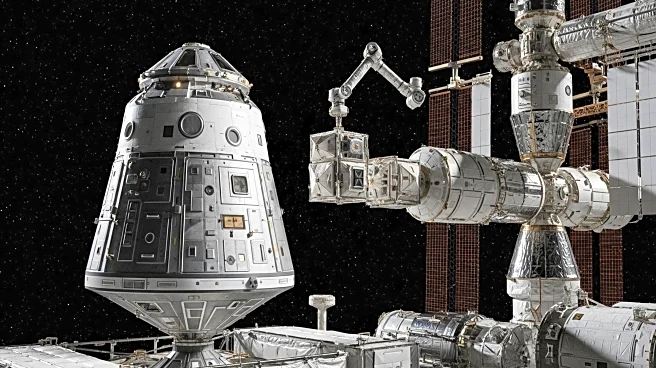What is the story about?
What's Happening?
The International Space Station (ISS) has received a new shipment of supplies from Russia's Progress 93 spacecraft. The robotic freighter docked with the ISS's Zvezda module at 1:23 p.m. EDT on September 13, 2025, after launching from the Baikonur Cosmodrome in Kazakhstan two days earlier. The spacecraft delivered 2.8 tons of food, fuel, and other essential cargo to support the astronauts currently on the ISS as part of Expedition 73. The Progress 93 will remain attached to the ISS for approximately six months before it undocks and re-enters Earth's atmosphere, where it will burn up. This delivery is part of a regular resupply mission to ensure the continuous operation and habitation of the ISS. Currently, the ISS hosts seven astronauts from NASA, the Japan Aerospace Exploration Agency (JAXA), and the Russian space agency Roscosmos.
Why It's Important?
The successful delivery of supplies by the Progress 93 spacecraft is crucial for the ongoing operations and research conducted aboard the ISS. The station serves as a vital platform for international collaboration in space exploration and scientific research. The supplies ensure that the astronauts can continue their work without interruption, contributing to advancements in various fields such as biology, physics, and materials science. The presence of multiple international crew members highlights the collaborative nature of the ISS, fostering partnerships between space agencies like NASA, Roscosmos, and JAXA. This mission also underscores the importance of reliable supply chains in space exploration, which are essential for the sustainability of long-term missions and the future of human presence in space.
What's Next?
Following the arrival of Progress 93, another cargo spacecraft, Northrop Grumman's Cygnus, is scheduled to launch on September 14, 2025, and is expected to dock with the ISS on September 17, 2025. This upcoming mission will further bolster the supplies and equipment available to the ISS crew, ensuring the continuation of their scientific and exploratory activities. The ongoing resupply missions are part of a broader strategy to maintain the ISS as a hub for international space research and to prepare for future missions beyond low Earth orbit.















